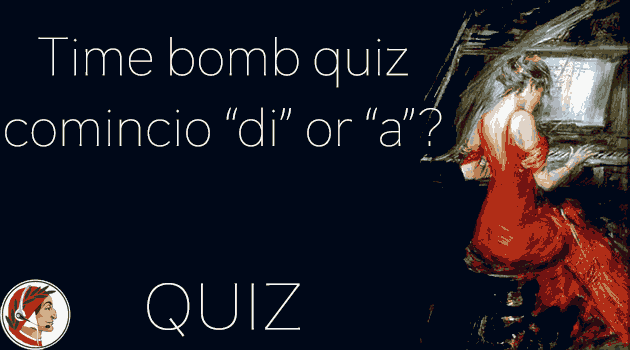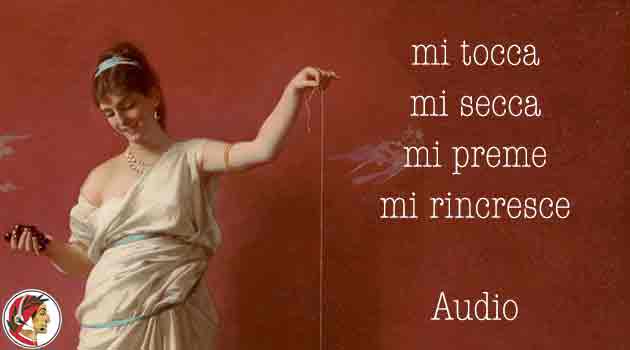Scegliere tra l’indicativo il congiuntivo richiede molta pratica e un po’ di buon senso.
Abbiamo parlato diverse volte della differenza tra l’indicativo e il congiuntivo, quindi non scenderò in dettagli. Ci concentreremo sul quiz. Cominciamo.
Ciao, come stai? Spero che i nostri quiz ti stiano aiutando.
Nella frase che avete appena letto, notiamo tre elementi principali che contraddistinguono il congiuntivo.
- due frasi unite da “che”
- due soggetti differenti
- un verbo di speranza (opinione, incertezza, un sentimento etc.)
L’indicativo è nella frase principale (reggente) mentre il congiuntivo è sempre in una frase dipendente.
A grandi linee, l’indicativo rappresenta il mondo della realtà, dei fatti che ci circondano. Il congiuntivo invece rappresenta le possibilità, le opinioni, i sentimenti e i punti di vista.
Questo esercizio servirà a consolidare quello che hai già studiato, quindi do per scontato che tu abbia già familiarità sia con il congiuntivo che con l’indicativo.
Ci sono altre altre situazioni che introducono il congiuntivo, ma mi fermerò qui.
Alla prossima
Quiz-summary
0 of 2 questions completed
Questions:
- 1
- 2
Information
LOADING QUIZ...
You have already completed the quiz before. Hence you can not start it again.
Quiz is loading...
You must sign in or sign up to start the quiz.
You have to finish following quiz, to start this quiz:
Results
Time has elapsed
Your score is 0 out of 0 points, (0)
| Average score |
|
| Your score |
|
Categories
- Not categorized 0%
-
Trial Class on Skype or Zoom
Want to try one for free?
55 minutes with a native Italian teacher
[process_steps type="horizontal" size="small"] [process_step title="book your class" icon="calendar-check-o"] [/process_step] [process_step title="see you on zoom" icon="video-camera"] [/process_step] [process_step title="or skype" icon="skype"] [/process_step] [/process_steps]
- 1
- 2
- Answered
- Review
-
Question 1 of 2
1. Question
Indicativo o Congiuntivo?
[divider_padding]Quiz
Controlla il tuo punteggio e le statistiche alla fine del quiz
livello:intermedio
Metti la forma giusta del verbo all'indicativo o al congiuntivo. Qualsiasi tempo. Attenzione ai pronomi. Esempio:- Ho sentito che Mario (sposarsi) si è sposato il mese scorso.
- Pare che Mario (sposarsi) si sia sposato il mese scorso.
-
- Non eravamo sicuri che lui (farcela) (ce la facesse), ma ha passato l'esame brillantemente.
- Suo nonno le ha regalato una casa che adesso (valere) (vale, varrà, varra') sicuramente un milione di euro.
- Il telefono che mio figlio (comprare) (ha comprato, aveva comprato) prima delle vacanze, è già rotto.
- Non sapevo che Torino (essere) (fosse) una città così bella.
- Non avremmo mai pensato che (tu-suonare) (suonassi) così bene il piano.
- La polizia mi ha raccontato quello che i ladri (rubare) (hanno rubato, avevano rubato) a casa mia mentre (io-essere) (ero) in vacanza.
- Pensavo che la tua amica non (sapere) (sapesse) sciare, invece è molto brava.
- Sono tornata al negozio per cambiare la borsa che (io - comprare) (ho comprato, avevo comprato) sabato. All'inizio volevo che la commessa mi (restituire) (restituisse) i soldi, ma poi ho pensato che (essere) (fosse) più conveniente comprarne un'altra.
Correct
Controlla le risposte giuste e continua con la prossima domanda.
↓↓↓
Incorrect
Controlla le risposte giuste e continua con la prossima domanda.
↓↓↓
-
Question 2 of 2
2. Question
Seleziona le frasi corrette
Potrebbe essercene più di una per gruppo
Correct
☑ La tua selezione. Controlla il tuo punteggio finale.↓↓↓
Incorrect
☑ La tua selezione. Controlla il tuo punteggio finale.↓↓↓
Alla prossima!
Statua: Antinoo – Villa Adriana, Tivoli. (II secolo d.C.)







